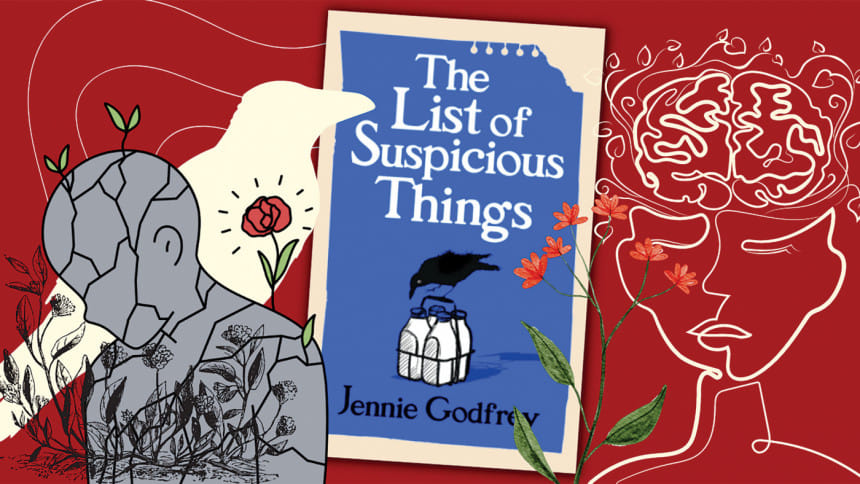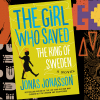A list of life lessons

Set in 1979, this is a story of monsters—the ones who prey on the vulnerable, the ones that exploit our weaknesses, and the ones that we elevate to positions of power.
11-year-old Miv does not have the happiest of home lives, though things were very different when she was younger. Her mother was lively and loving, and her father equally so. But suddenly, everything changed, and now Miv is living with a mother who seems to have lost interest in life, spending spells in hospital, and a father who is struggling to cope.
To make matters worse, her mother's inexplicable illness has resulted in Miv's Auntie Jean moving in with them. And Auntie Jean comes with a lot of baggage—not least of which are her ideas about "a woman's place". Set at a time when Margaret Thatcher has come into power, there are clearly radical differences of opinion in Britain about where a woman's place actually is.
Miv is an endearing protagonist, and her friendships—with Sharon, and the Asian newsagent's family—are beautifully rendered. A young widower, Mr Bashir, has moved from Bradford to make a new life with his teenage son, Omar. Unfortunately, the family becomes a target for local bullies, whose racist attitudes are further inflamed when Sharon and Omar fall in love.
In fact, there are only two things that the Yorkshire folk inhabiting Miv's social landscape seem to agree on. The first is that Thatcher's rise to power (earning her the nickname of "milk snatcher" for cancelling free school milk) will likely lead to problems in the Yorkshire mills and mines. And the second is that the serial killer, the Yorkshire Ripper, is bad news for everyone—even if it is primarily young women he's targeting.
When Miv overhears her father and aunt discussing leaving Yorkshire in the context of the Ripper murders, she is terrified to think of losing her best friend, Sharon. So, Miv decides they must catch the Ripper themselves to prevent that. How? Well, they can start by making a list of any suspicious things that they see or hear...
This is an evocative, often tender snapshot of northern Britain on the cusp of the 1980s which will strike a chord with anybody who lived through that time. I was a student at the London School of Economics nearly a decade later, and remember the shocking changes that followed Thatcher's ascension.
I had never seen people living in cardboard boxes during my childhood holidays in London. But now, hurrying home from an evening study session at the LSE library, I would often pass homeless people huddled in shop doorways at night. Yorkshire fared even worse. And, set at the beginning of that period, there is a justified sense of foreboding that permeates this insightful novel.
Miv is an endearing protagonist, and her friendships—with Sharon, and the Asian newsagent's family—are beautifully rendered. A young widower, Mr Bashir, has moved from Bradford to make a new life with his teenage son, Omar. Unfortunately, the family becomes a target for local bullies, whose racist attitudes are further inflamed when Sharon and Omar fall in love.
This had particular resonance for me, as my earliest experience of racism was as a four-year-old visiting my uncle in London. I was puzzled when my English aunt got upset after the (white) neighbour told Aunty Steph that I was not allowed to play with her daughter because they didn't like "blackies". Too young to understand the significance of all this, I never forgot the disappointment of being unable to play with the little girl who had waved across the fence at me in such a friendly fashion.
After Sharon begins to lose interest in their investigation, Miv's continued preoccupation with the list of suspicious things may at times seem almost a little obsessive. But it is clear that Miv, struggling with her anxiety over the state of her family life, the threat of possible relocation, and the fear of losing Sharon's friendship to Omar, is simply using the hunt for the Ripper as a way to distract herself from her troubles.
In that sense, despite the title, this book is not really about the search for a serial killer. It considers a range of issues from that era, including racism, sexism, bullying, xenophobia, and mental health challenges, as well as the eternal and universal yearning for love, friendship, and family. And despite the gravity of some of its themes, the novel is undeniably engaging. There is also a very clever tie-in at the end, which reveals the cause of Miv's mother's problems.
Above all, the story is relatable to anyone who remembers how it felt to be a child. When I was Miv's age, my friends and I were repeatedly warned not to sit near the edge of the roof, where there was nothing to hold on to and a three-storey height to fall from. So, as you've probably guessed, we just took turns breaking the rules—with one of us keeping watch, while the others sat on the edge of the roof dangling our legs recklessly off it and speculating, with typically bloodthirsty interest, which bits would be left intact if someone fell!
At its heart, this is a cautionary tale about how the world of children intersects—often uncomfortably, and sometimes disastrously—with the world of the grownups around them. Miv is a wonderfully vibrant figure who leaps off the page straight into the reader's heart.
The same is true of many of Godfrey's characters—like the librarian Mrs Andrews, whose charming husband Gary is not who he seems. Or Mr Bashir, Omar's father, who is remarkably perceptive when it comes to dealing with the people around him. Overall, this is a novel I highly recommend as an absorbing read, especially for those who enjoy coming of age stories.
Farah Ghuznavi is a writer, translator, and development worker. Her work has been published in 11 countries across Asia, Africa, Europe, and the USA. Writer in Residence with Commonwealth Writers, she published a short story collection titled Fragments of Riversong (Daily Star Books, 2013), and edited the Lifelines anthology (Zubaan Books, 2012). She is currently working on her new short story collection and is on Instagram @farahghuznavi.

 For all latest news, follow The Daily Star's Google News channel.
For all latest news, follow The Daily Star's Google News channel. 









Comments